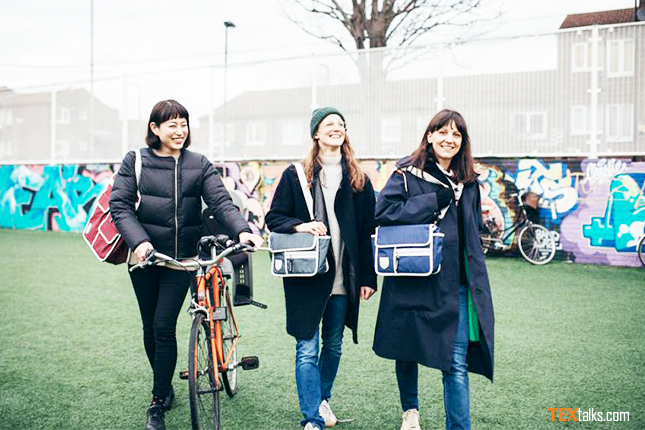Sustainable practices in the textile industry include using fewer amounts of water, hazardous chemicals, pesticides, and fertilizers; adopting eco-friendly production processes; using less energy for production processes; and introducing 3 Rs: Reduce, Reuse, and Recycle.
Various designers are promoting sustainability by blending culture and fashion. The designers include:
Ali Namadari founded his company Labo Mono. The company follows feelings of frustration that there wasn’t a practical jacket that suited his London lifestyle, a weather-resistant garment that he could wear to meet a client, get the tube, and cycle to work – which was also bright and stylish. Namadari came across a recycled polyester fabric at a Paris trade show. The textile was made from water bottles shredded into small pellets and then turned into polyester yarn. This process has the added benefits of using less water and less electricity. After finding the recycled fabric, Namadari also sourced Bionic Finish Eco, a biodegradable waterproofing agent, which serves as an alternative to the pervasive chemical compound, PFC. He reduces plastic waste by wrapping goods in fabric to be exported, which is then later reused.
Jacqui Ma developed her products in response to a gap in the market, especially for bags. While on maternity leave, living above a bike shop in Hackney, Ma noticed an absence of well-designed cycling accessories and set to work setting up her company, Good Ordering. The bags are made with 30 percent recycled polyester, and all Ma’s new products will be made from this material. Although it is a balancing act, she is also clear about how sustainability is improved by brand transparency and customer engagement.
Emma Lougbridge designs community-inspired products. Her handmade bucket hats are a twist on the classic Manchester icon and reflect the creative community. She came up with the idea for her company, Lid, after a serendipitous meeting on the street. Inspired by menswear designers like Carhartt and the dreamy qualities of Molly Goddard, Lougbridge places sustainability front and center of her work. As well as reusing all their scrap fabric as labels, Lid creates products from sustainable wool, linen, and upcycled materials sourced from charity shops. After learning from previous employers, Lougbridge is passionate about ensuring sustainability at Lid is about more than just marketing.
The future of brands and sustainability, for Lougbridge, is obvious, but there is still an issue with cost. All these designers are connected to the people they create is emblematic of a new kind of democratic design: born of an understanding of contemporary urban lifestyle, intricately woven with customer feedback and driven by sustainable goods.



